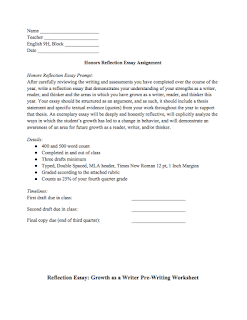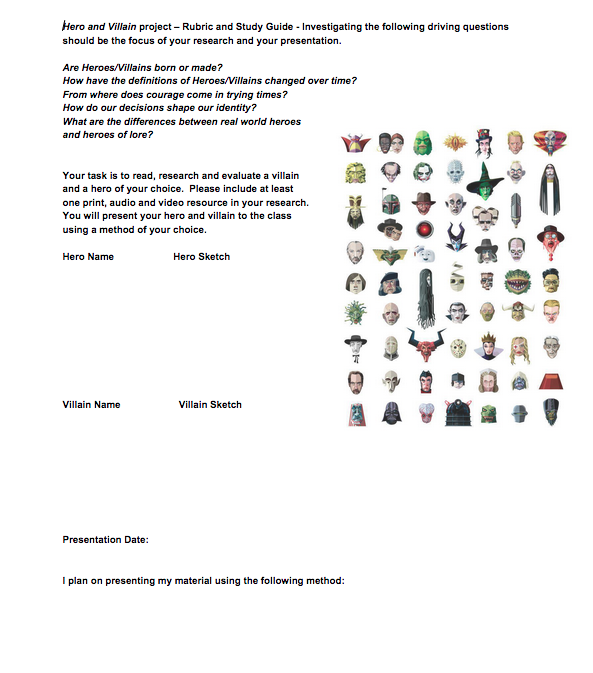Month: February 2015
Heroes and Villans Project- Harry Potter Movie
Block 5 and 6 Presentation Reminders
Honors Reflection Essay Assignment
Honors Reflection Essay Prompt: After carefully reviewing the writing and assessments you have completed over the course of the year, write a reflection essay that demonstrates your understanding of your strengths as a writer, reader, and thinker and the areas in which you have grown as a writer, reader, and thinker this year. Your essay should be structured as an argument, and as such, it should include a thesis statement and specific textual evidence (quotes) from your work throughout the year to support that thesis. An exemplary essay will be deeply and honestly reflective, will explicitly analyze the ways in which the student’s growth has led to a change in behavior, and will demonstrate an awareness of an area for future growth as a reader, writer, and/or thinker.
Details:
- 400 and 500 word count
- Completed in and out of class
- Three drafts minimum Typed, Double Spaced, MLA header, Times New Roman 12 pt, 1 Inch Margins
- Graded according to the attached rubric Counts as 25% of your fourth quarter grade
H/V Project Sketchbook by Josh H
Heroes and Villains Project – Madman Writings
Madman Writing #1: Who do people call heroes?
Many people refer others as heroes who make inhuman football catches, play an instrument, or an author who writes a book. Others call our president, generals, or figures with high authority heroes. However, many do not recognize the people who fight and keep us healthy and safe. Firefighters put themselves at risk by saving people trapped in fires. Police officers deal with insane and villainous people to prevent others from being harmed. Other heroes could be the one that make us smile, laugh, and/or cry with joy. For example, one’s best friend can be a hero. It’s not only the big, famous names who are heroes – they exist within our society, whether they be doctors, police officers, and soldiers, to our mother, father, best friend, or brother.
Madman Writing #2: Is Luke a born or made hero?
I believe that Luke is a bit of both. Naturally, he had the desire to leave Tatooine and become a pilot. By his character in the original Star Wars film, he had a big heart – a great trait for a born hero. However, he never naturally had in mind to blow up the Death Star, or to redeem his father from the dark side – some of the things that make Skywalker heroic. Luke would have never done these things if he wasn’t saved by Ben Kenobi, or found out that Vader was his father. In those cases, Luke is a made hero as he wasn’t born or prophesized to do the great things he did (unlike his father who was the Chosen One).
Madman Writing #3: From where does courage come in trying times?
I’ll answer this question using the ending of “The Empire Strikes Back.” At this point in the film, all of the protagonists are at their lowest point. Luke is emotionally destroyed from his battle with Vader and lost his right hand. Leia (as well as the others) is emotionally destroyed because the love of her life, Han Solo, is frozen in carbonite and taken prisoner to Jabba the Hutt. Although these setbacks appear to put the characters in a bad state, the final scenes of the film show a glimmer of hope – Luke talking to Lando Calrissian and Chewbacca as they start their journey to find Solo, and Leia/Luke/R2/C-3PO watch the Millennium Falcon fly into space without a tear shed. The audience knows that they’re not ready to give up.
Madman Writing #4: Are heroes/villains born or made? (Is Darth Vader a born or made hero?)
To me, some heroes are born – for example, Darth Vader. Though he joined the dark side from temptation (desire to save his wife), his son and wife both sensed some good in him – foreshadowing for Vader’s future to come. The ending scene to “Return of the Jedi” with The Emperor electrocuting Luke puts Darth Vader in emotional conflict – he has the implied choice of saving his son, or supporting his master. The good in him tells Vader to save his son – his only link to Padme. Vader’s love for his family overrides his loyalty for Palpatine and overthrows him. Darth Vader dies as Anakin Skywalker, a naturally born hero prophesized to bring balance to the Force and destroy the Sith.
Madman Writing #5: How do decisions shape our identity?
I’m going to use Anakin again for this. His actions as an impatient, whiny Jedi Padawan/knight led to his downfall as Darth Vader. He let his emotions get to him (especially anger) which allowed Palpatine to pull his strings with ease. To him, Skywalker is now an emotionless, cruel, figure with no heart anymore due to the loss of his wife and the presumed death of their child. Later, Palpatine tells Vader that Luke Skywalker is growing strong in the Force. I infer that this awakened Vader’s good side, as he found out that a part of his family is still alive. Darth Vader attempts to turn Luke to the dark side with temptation to overthrow the Emperor and rule the galaxy together, but fails. Luke senses the good in Vader and due to events explained above, Vader’s decision to overthrow Palpatine shapes his identity as Anakin once more.
H/V Reflection
Blood of Olympus Or End of Olympus?
By Gwyneth Schloer
The giants have risen along with thousands of long passed-away monsters who have only one thought on their minds: “Awake Gaea and take revenge”. In this finale to a long and adventure-filled series, heroes Annabeth, Jason, Percy, Leo, Piper, Hazel, Nico, Frank, Reyna, and Coach Hedge are aboard the Argo II trying to save the world from destruction, as the Greek and Roman camps attempt to slaughter each other.
The Mother Earth Goddess, Gaea, is rising from her once eternal slumber, and the only thing in the way of her rising, is the blood of a male and female hero, the Blood of Olympus. If she wakes, it is almost certain the world will end. Caught up in their petty rivalry that has taken place for hundreds of years, the Roman camp doesn’t even know that they should be helping the heroes fight against Gaea. Malicious, self-centered and evil Octavian decides it is the camp’s best interest to target and kill the Greek camp in order to end the God’s silence. What the Romans and Octavian don’t know is that the Gods are silent because they are suffering from an extreme case of multiple personailty disorder. Due to the conflict taking place between the Romans and the Greeks, the Roman and Greek sides of the Gods both want their side to win, so the Gods’ brains are constantly switching between personalites. In order to stop this so that the Gods can assist in the saving of the world, the two sides must stop fighting. Only then will the demigods and Gods be able to team up and defeat Gaea and her evil army of Giants. With Octavian in charge manipulating the Roman legion’s minds, there is no chance that peace will happen any time soon. The only chance that the Greeks have at surviving relies on the Athena Parthenos statue that was retrieved by the demigod heroes. It is said that the statue has magical powers, so the heroes decide this might be a good way to defend the Greeks from the pending Roman attack. The only trouble is, how are they to get it across the world in such a small amount of time? On the other side of the world, while Reyna, Nico, and Coach Hedge attempt to bring the Athena Parthenos to Long Island, its home, the heroes on Argo II are trying to kill all the giants that have risen in order to make sure they don’t succeed in awaking Gaea.
Writer Rick Riordan provides an outstanding ending to his five-part epic, Heroes of Olympus, in The Blood of Olympus. Not only does he bring back the stories of the Gods and the heroes, but he also inserts jokes, slang, references, and items relevant to today’s society, such as a Wii remote and the series Doctor Who. The dynamic characters, or heroes, in The Blood of Olympus represent the ideal humans and their flaws and imperfections. Even the relationships between each character were carefully thought out based on what mood the character was in, who was in the room, and what had just happend or what was about to happen. In this desperate fight to stop the ever-nearing end of the world, the author mixed in stories of love, tragedy, and comedy. This modern twist on Greek and Roman mythology deserves a full five-star rating.











